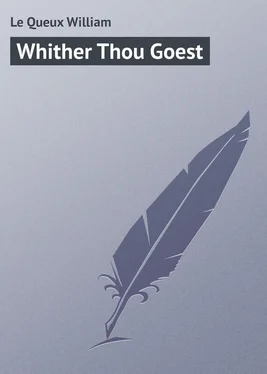William Le Queux - Whither Thou Goest
Здесь есть возможность читать онлайн «William Le Queux - Whither Thou Goest» — ознакомительный отрывок электронной книги совершенно бесплатно, а после прочтения отрывка купить полную версию. В некоторых случаях можно слушать аудио, скачать через торрент в формате fb2 и присутствует краткое содержание. Жанр: foreign_prose, на английском языке. Описание произведения, (предисловие) а так же отзывы посетителей доступны на портале библиотеки ЛибКат.
- Название:Whither Thou Goest
- Автор:
- Жанр:
- Год:неизвестен
- ISBN:нет данных
- Рейтинг книги:5 / 5. Голосов: 1
-
Избранное:Добавить в избранное
- Отзывы:
-
Ваша оценка:
- 100
- 1
- 2
- 3
- 4
- 5
Whither Thou Goest: краткое содержание, описание и аннотация
Предлагаем к чтению аннотацию, описание, краткое содержание или предисловие (зависит от того, что написал сам автор книги «Whither Thou Goest»). Если вы не нашли необходимую информацию о книге — напишите в комментариях, мы постараемся отыскать её.
Whither Thou Goest — читать онлайн ознакомительный отрывок
Ниже представлен текст книги, разбитый по страницам. Система сохранения места последней прочитанной страницы, позволяет с удобством читать онлайн бесплатно книгу «Whither Thou Goest», без необходимости каждый раз заново искать на чём Вы остановились. Поставьте закладку, и сможете в любой момент перейти на страницу, на которой закончили чтение.
Интервал:
Закладка:
“An unexpected pleasure, Mrs Hargrave,” he cried in a very uncertain voice. A more embarrassed specimen of a budding diplomatist could not have been observed.
The pretty widow ignored the outstretched hand. She looked at him steadily, and the blue eyes were no longer soft and limpid, but hard as steel.
“I think,” she said in a voice that was as hard as her glance, “you are indulging in the language of diplomacy, which is usually used to disguise one’s real thoughts.”
Rossett turned red, and began, in his agitation, to stammer forth lame and foolish excuses.
“I have been awfully busy lately, you know, not had time for anything in the social line. The truth is, Mrs Hargrave, I have just woke up to the fact that I have been wasting a good part of my life. I am really going in now for work, hard work, and ambition.”
She swept him with a contemptuous glance.
“Is this supposed to be an apology for your despicable conduct as regards myself?”
“As you please to take it, Mrs Hargrave.” Knowing he was utterly in the wrong, he took refuge in a sort of sullen dignity.
Her voice grew more scornful as she answered in her clear, vibrant tones.
“I should not like to detain you even for a moment, when you have such a laudable object in view. If you are going to atone for those wasted years, you will have a tremendous lot of leeway to make up. You cannot spare a second. Good day.” He could not rally under her sharp tongue and keen woman’s wit. He bowed, and was about to move away when she stopped him with an imperious gesture.
“One moment of your valuable time, if you please, Mr Rossett. You are fond of running away when the situation becomes a little inconvenient to yourself. But on this, I hope, our last meeting, I wish to say a few words to you, which it is well you should hear. May I presume to trespass on your time for a few seconds longer?”
There was still in her tones the same bitter note of sarcasm. But by this time, Guy had recovered himself a little, and was able to muster a remnant of dignity.
“My time is at your disposal,” he replied quietly.
“You have not acted the part of a gentleman, Mr Rossett. You were supposed to be my husband’s friend; you pretended to be mine. Certain events occurred, the nature of which it is easy to guess, which caused you to think my friendship was no longer desirable. That is the truth, is it not? Be frank for once, if a diplomatist can ever be frank.”
She dominated the situation. Rossett could only stammer forth a shamefaced admission that it was the truth.
“You admit it. Would you not have played a more manly part, if you had come to me with a frank and proper explanation of those events?”
“That is just what I ought to have done,” said Guy Rossett humbly. He had never admired her more than now. Up to the present moment he had no idea that this dainty, slender woman, more or less of a butterfly, had such spirit in her fragile frame.
“Instead of that,” pursued Violet Hargrave in her inflexible, vibrating tones, “you adopt a device pursued by many men I know, by the type of man who lacks moral courage. I am afraid I shall hurt you a little now, but I don’t mind because you have hurt me, and I want to cry quits. You adopted the coward’s device of running away from the woman to whom you were afraid to tell the truth.”
Rossett was utterly beaten. He could not say a word in self-defence. He stood speechless under the lash of her scorn, her not unjustifiable indignation. She dismissed him with a wave of her hand.
“I will keep you no longer, Mr Rossett. For some years we were rather intimate friends. To-day we are strangers. As a stranger, I will bid you good-bye.”
And Guy Rossett was happy to escape. He had never felt more humiliated in his life.
He put himself into a taxi, and drove straight to the St. James’s Club, beloved of diplomatists. He ruminated ruefully over his discomfiture at the hands of the sharp-tongued Mrs Hargrave.
“Some women have the knack of making a man feel like a worm,” he thought bitterly. “Mary has it in her quiet, incisive way. Violet has it to perfection.”
The young widow entered the sanctum of the moneylender. Outwardly, her demeanour was calm, but in her breast a volcano was raging. Her pride had been humbled, her hopes ruthlessly crushed. She was raging with all the resentful impotence of the woman scorned.
Jackson met her with outstretched hands, and took both of hers.
“My poor little Violet,” he said kindly. “I can see you are very upset; at least, it is plain to me who have known you from a baby. If you had only told your maid to ’phone me up before you started, I would have delayed you, and prevented this.”
She sank down on a chair with a little weary sigh. “You have always been my best friend, Juan. Heaven knows what I should have done or where I should have been without you.”
“Tut, tut.” The “financier” was very human where women were concerned. “And you are fond of this fellow, eh, apart from other considerations?”
“I was, Juan, but now I hate him,” was the uncompromising reply. “Still, on the whole, I am not sure I would have missed that little talk with him. Clever young man of the world as he is, ready and quick as he was, I cut him to the quick. I made him feel very small.”
Jackson chuckled. “I will wager you gave him a good dressing down, when you once started. Well now, my child, I guess you want to see me on something important.”
“Something very important,” was the reply.
The two drew their chairs closely together, and conversed in low tones, using the Spanish language.
Chapter Three
To a man of Lord Saxham’s ancient lineage and broad acres, although those same broad acres were somewhat heavily encumbered, General Clandon was a mere nobody. He was just one of the many thousands of persons who are entitled to be called gentlemen, as a matter of courtesy, but have no claim to rank in the same category with pure aristocracy.
All the same, the General came of very respectable stock, from that section of the small landowning class which is the backbone of the territorial interest. His forbears had been settled in Kent for some six generations. His eldest brother, Hugh Clandon, who had ruled over Clandon Place, had a rent roll of some five thousand a year clear.
To an ordinary person, in a lower walk of life, this would seem by no means a despicable income. But Clandon Place was a large house, and cost a good deal to keep up, even on an economical scale. And all the Clandons, with the solitary exception of the General himself, were exceedingly prolific.
His brother Hugh had eight children. He was one of ten. Daughters had to be portioned off, sons had to be educated and started in the world. Geoffrey Clandon inherited a few thousands on his father’s death; he always thought his father must have been a wonderful man to leave so much, considering the calls upon him. The General contrived to live upon the modest income derived from this small capital, plus his half-pay.
He now lived at Eastbourne upon the somewhat slender revenue. When he died, his only child, Isobel, would have a few hundred pounds a year to call her own.
In his youth, he had been exceedingly handsome, and, had he been of a more worldly turn of mind, he might easily have married money. Instead, he married for love, and never repented it. His wife brought him no fortune, but she brought him other things beyond price.
Mrs Clandon died when Isobel was sixteen, and all the intense love which the General had borne his wife was transferred to his daughter, who fully reciprocated her father’s devotion.
She was a very sweet and lovable girl, perhaps just a little wiser and older than her actual years, as is often the case with only children, who have been brought up in close companionship with their parents.
Читать дальшеИнтервал:
Закладка:
Похожие книги на «Whither Thou Goest»
Представляем Вашему вниманию похожие книги на «Whither Thou Goest» списком для выбора. Мы отобрали схожую по названию и смыслу литературу в надежде предоставить читателям больше вариантов отыскать новые, интересные, ещё непрочитанные произведения.
Обсуждение, отзывы о книге «Whither Thou Goest» и просто собственные мнения читателей. Оставьте ваши комментарии, напишите, что Вы думаете о произведении, его смысле или главных героях. Укажите что конкретно понравилось, а что нет, и почему Вы так считаете.












